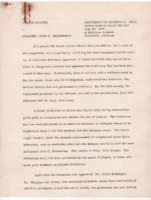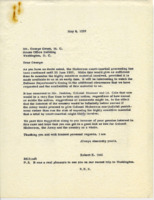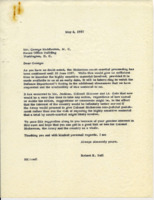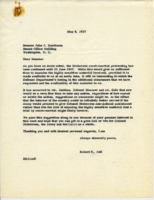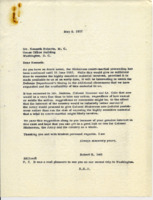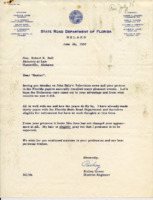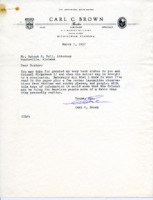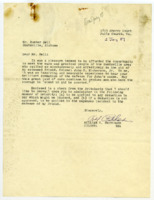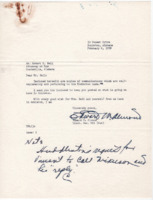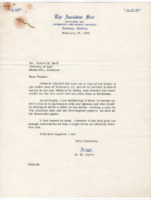
Browse Items (43 total)
Sort by:
-
Argument of Robert K. Bell before the General Court-Martial in the case of United States v. Colonel John C. Nickerson, Jr.
Argument of Robert K. Bell before the General Court-Martial at Redstone Arsenal in defense of Colonel John C. Nickerson, Jr. Nickerson plead guilty and Bell's testimony was present in an effort to "extenuate or mitigate whatever he might have done." Bell calls Nickerson's judgment "bad" and his actions "unfortunate" and "careless" but argues that he is not disloyal, disobedient, or promoting his own welfare above that of the Army or national security. -
Correspondence between George Grant and Robert K. Bell.
Bell writes to Grant in Washington D.C. on behalf of the defense counsel in an attempt to change Nickerson's case from trial by court-martial to a non-judicial punishment. Grant responds with interest and states that it looks as though the Army may "drop the Colonel Nickerson case by non-judicial punishment." -
Correspondence between George Huddleston and Robert K. Bell.
Bell writes to Huddleston in Washington D.C. on behalf of the defense counsel in an attempt to change Nickerson's case from trial by court-martial to a non-judicial punishment. Huddleston responds stating his will "make a discreet request" to Secretary Brucker and General Maxwell. -
Correspondence between John J. Sparkman and Robert K. Bell.
Bell writes to Sparkman in Washinton D.C. on behalf of the defense counsel in an attempt to change Nickerson's case from trial by court-martial to a non-judicial punishment. Sparkman thanks Bell for his letter from May 8 and responds that he has already been "dropping some suggestions" regarding Bell's hope to give Nickerson a non-judicial punishment rather than trial by court-martial. -
Correspondence between Kenneth Roberts and Robert K. Bell.
Bell writes to Roberts in Washington D.C. on behalf of the defense counsel in an attempt to change Nickerson's case from trial by court-martial to a non-judicial punishment. Roberts responds that he has done everything he could on the matter. -
Correspondence between Richey Green and Robert K. Bell.
Green writes to Bell saying he saw him on the news following the Nickerson case and he hopes the results were to his satisfaction. Bell writes to Green in response saying he is pleased at the outcome of Nickerson's trial and asks Green to visit him if he is ever in North Alabama. -
Correspondence between Robert K. Bell and Carl C. Brown.
Brown wishes Bell the best in the Nickerson case and expresses support for the Colonel. Bell's response thanks Brown for his support. -
Correspondence between Robert K. Bell and Colonel William C. Pritchard.
Pritchard writes to Bell, sending a check for Colonel Nickerson to be used for any fines that would be imposed or for the expense of the defense of Nickerson. Bell responds with his sincere thanks and writes that he has given the check to Colonel Nickerson. -
Correspondence between Robert K. Bell and Edward M. Almond.
These letters include information pertaining to the Nickerson case. Almond expresses desire to "get something in motion to subdue the unnecessary and trivial expressions of � General Medaris". The letters also mention various correspondence that was included in the exchange of information. Both men advocate for the "cause" of Colonel Nickerson's actions. Bell was Nickerson's attorney during his trial. -
Correspondence between Robert K. Bell and Harry M. Ayers.
In response to Bell's February 13 letter from Edward Almond, Ayers informs Bell that he is attempting to find someone who would write a letter to newspaper publications in agreement with their opinion that Medaris is taking too much credit for his work. Bell responds that he is skeptical Ayers would find anyone as Medaris could make their life a "rather miserable existence".
